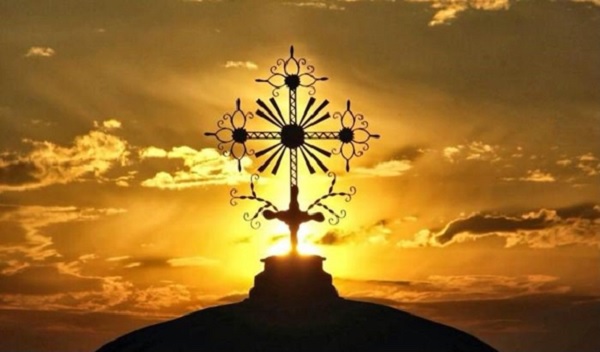Taking up our own Cross (Sunday of the Veneration of the Cross)
19 March 2023In today’s Gospel, Christ wants to talk to us about the mystery of His passion and the cross. How, through the cross and death, He made human nature, which He had assumed, a sharer in eternal life. For this reason His death on the cross became a herald of life and immortality, not only for the human nature He Himself bore, but for the whole of the human race. The cross gives joy and incorruption to every human person.

This progress towards the cross and death has become the sole path of salvation for us. If we’re to become sharers in ‘immortal life’, we have also to participate in the sufferings, the cross, the sacrifice of the Lord. We have to mortify our passions and the desires of our carnal nature and, moreover, our very own nature, our body and anything else that might lead us into a life independent of that which is real, which is a relationship with God. This is what Christ meant by ‘Let them follow me’, which we heard in today’s Gospel. We don’t know Christ in intellectual terms, but through sacrifice, as being ‘crucified’. The saints longed to suffer with Christ. Not just to fast, to humble themselves and to give alms, but to undergo the ultimate sacrifice. And they thanked God for this. We know ‘real life’ through death. The best life is if we suffer for Christ and die for Him. In this life, the great thing isn’t to suffer a little bit, or even a lot, but to be close to Christ, come what may. If the worldly outlook is crucified within us, then we live and truly exist.
There are two choices before each of us: one is life ‘with Christ’ and the other is ‘without Him’. Life without Christ is that which results from the desires and yearning of our carnal nature, of ‘the old person’, as Saint Paul says. If we don’t think about God, we’re also not interested in ‘life in Him’. We care about accumulating wealth in order to enjoy the pleasures of the present life, which satisfy the demands of nature. But with that way of life, we’re preparing eternal death for ourselves. But if we make the first choice, if we want to nourish our life on our relationship, our love and our communication with God, then we’ll forever be opposed by our nature which has an inclination towards sin. It’s the ‘thinking of the flesh’ which sets up fierce resistance, and unless we struggle against it inwardly we won’t be aware of it.
This is why Christ tells us to take up the cross, to deny the pleasure-seeking desires of the flesh and the life-friendly urges of our nature to the point where we subjugate it to the will of God, so that it can also share in immortality and eternity. But this implies asceticism, an internal struggle which is painful, a cross. Unless we take up our cross on a daily basis in order to mortify our sinful passions, as the Gospels tells us- that is, as did the Lord, and thereafter the Apostles, the martyrs and all the saints- we can’t always ‘be with Christ’.
Christ tells us that if we choose to gain this transient life of our nature, we’ll lose eternal life. This can happen either through routine, with our desire to enjoy fleeting pleasures, indifferent to God and His will, or, in life-threatening circumstances, if we refuse to bear witness to Christ, in order to cleave to our physical life. But if we lose and negate our physical life and whatever derives from it ‘for Christ’s sake’ and ‘for life with God’, then we’ll save our life and gain eternity.






